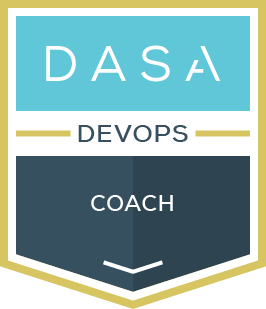The newly updated DevOps Fundamentals training has gained global traction with scheduled sessions in Spain, Latin America, India, and beyond. Coaching professionals eagerly look to this training as a means to equip themselves with the knowledge and tools necessary for guiding teams and organizations toward DevOps excellence.
While understanding the principles of DevOps is essential, the true magic happens when these principles are adopted into various industries, organizational and cultural contexts, and teams. Overcoming the challenges associated with change and enabling for a high performance is where the real value of DevOps coaching emerges, marking the significance between the theory learned and the actual implementation.
The Transformative Power of DevOps Fundamentals Enabled by Coaches
DevOps Fundamentals is a comprehensive toolbox, developed by seasoned experts and reviewed by leading practitioners, encompassing theory and practical applications at multiple levels, from individuals to teams, management, and the organization as a whole. An experienced coach would focus not only on sharing tools and practices but also on understanding the “why” behind these practices, fostering a contextual and valuable learning experience.
In order to introduce DevOps Fundamentals as a key step in a coaching initiative in organizations, it’s essential to recognize the right opportunities and recognize relevant indicators. Signs like reduced responsiveness and rising staff turnover may serve as potential tensions that an upskilling e.g. in the form of a training is adecuate. Furthermore, these cues may indicate that adopting DevOps practices is necessary to boost efficiency and competitiveness within the organization.
When evaluating a team’s preparedness for DevOps Fundamentals training at the team level, it’s crucial to approach the assessment with flexibility. Rather than relying on rigid maturity models, it is advisable to consider them as self-assessment instruments. One illustrative example of such self-assessment tools is the notion of “selfies,” where teams gauge their advancement by examining various aspects like culture, automation, lean and agile practices, metrics, and knowledge sharing. This approach empowers teams to independently chart their routes to enhancement, with a coach nurturing a self-directed learning atmosphere to an extent marked by the results of said assessment. Creating a feedback culture backed by effective practices is also an integral aspect of the DevOps culture; gathering input from practitioners and learners shapes future events and improves the overall experience.
The transformative potential of DevOps Fundamentals training is underscored by the importance of bridging the gap between theory and practice, and the need for ongoing feedback to drive continuous improvement in DevOps coaching and implementation. It emphasizes the applicability of DevOps principles and the significance of assessing an organization’s readiness for change at both the organizational and team levels.
Tailoring Coaching Approaches for Effective DevOps and Agile Transformations
Adapting coaching practices to different team maturity levels is essential for successful DevOps and Agile transformations. One key factor that influences a coach’s approach is the CALMS framework, the base of DASA DevOps Fundamentals, which covers Culture, Automation, Lean, Measurement, and Sharing. The “C” in CALMS, Culture, is particularly crucial and often underestimated, as it includes qualitative factors such as psychological safety and the willingness of teams to open up, experiment, and innovate.
When working with newly formed teams, coaches need to emphasize the importance of psychological safety and create an environment where team members feel comfortable expressing their opinions and conducting experiments with uncertain outcomes. Leadership plays a vital role in supporting this cultural shift, and coaches must work alongside leadership to convey the significance of this change.
Coaches should also adjust their coaching style and tone when working with inexperienced teams. It’s important to encourage and motivate new teams while helping them understand the bigger picture presented by CALMS. Measuring progress through key metrics, like the four Key DevOps metrics provided by DORA (deployment frequency, lead time, time to restore services, and change failure rate), can help teams assess their performance and identify areas for improvement.
For maturing DevOps and Agile teams, the role of the coach may involve mentoring, coaching, and advising at different stages. Mentoring helps establish a common understanding and language, while coaching involves observing the team and helping them reflect on their practices. Advising comes into play when the team seeks specific guidance on addressing issues or themes.
To adapt coaching techniques to different team maturity levels, the use of visual management tools, such as mapping out actions, prerequisites, and impediments in a visual and transparent way, can be helpful. This exercise helps teams take control of their DevOps journey and live continuous improvement in day-to-day operations . It also serves as a powerful communication tool between teams and management.
Common obstacles when implementing DevOps practices at an enterprise level include resistance from middle management, outdated finance and budgeting processes , and siloed organizational structures. Overcoming these hurdles requires aligning the organization’s goals with DevOps practices, fostering a culture of collaboration, and rewarding the right behaviors, especially among middle managers.
It is essential to avoid methodological wars and change fatigue by focusing on the why behind DevOps practices rather than getting caught up in labels and preferred frameworks. Coaches must ensure that teams understand the business objectives and value they aim to deliver, promoting alignment and collaboration across the organization.
In the context of portfolio management, coaches play a crucial role in connecting teams’ efforts to strategic business objectives. They facilitate cross-team collaboration, promote learning from other teams, and help ensure that decisions align with the organization’s goals.
When measuring the impact of coaching, set achievable benchmarks that teams themselves can determine. Coaches should challenge teams to set goals they can sustain and adapt as necessary. In cases of organizational opposition or decisions hindering progress, coaches should engage with relevant parties and advocate for the organization’s best interests.
In summary, adapting coaching practices to team maturity levels and addressing common obstacles are key to successful DevOps and Agile transformations. Coaches must emphasize cultural change, align practices with business objectives, and facilitate collaboration across teams and management to drive meaningful progress.
Key Principles of Effective DevOps Coaching: Focusing on Purpose, Clarity, and Collaboration
The DASA DevOps Fundamentals program equips coaches with a set of invaluable principles and guidelines that are essential for enabling organizations through the complex journey of DevOps adoption. These principles translated into pragmatic advice lay the foundation for effective coaching and adoption of DevOps practices in the dynamic world of DevOps:
- Focus on the “Why” and Avoid Cargo Culting
It is important to understand the underlying reasons for adopting DevOps practices. Avoid “cargo culting,” which refers to blindly following practices without understanding their purpose. Instead, DevOps coaches should focus on the “why” behind DevOps transformations and to ensure that teams understand the rationale behind these changes. - Be Specific and Tangible in Goals
One of the critical aspects of effective DevOps leadership is setting clear and specific goals. Effective, facilitative leaders and coaches should ask their teams, “What behavior do you need from me for you to be successful?” By making these goals tangible and specific, it becomes easier to track progress and foster continuous improvement. - Outcomes Over Outputs
Prioritize outcomes over outputs. While tracking metrics like the number of trainings or workshops can be relevant, it’s more critical to determine whether the team understands the value they should be delivering and if they are achieving their change goals. Measuring success based on outcomes ensures that the team’s efforts align with the organization’s strategic objectives. - Jointly Define Change Goals
Collaboration is key to a successful DevOps transformation. Coaches should work closely with their teams to define change goals collectively. This approach ensures that everyone understands and takes ownership of the desired outcomes, creating a more motivated and accountable team. - Beware of Metrics Gaming
Avoid using metrics that can be easily gamed. When selecting metrics, it’s crucial to consider whether they encourage the right behaviors and outcomes. For example, focusing solely on reducing mistakes might discourage experimentation and innovation. Coaches should be mindful of unintended consequences when defining metrics. - DevOps Transformation Requires Effort
DevOps transformations are not easy, and they require dedication and effort. It’s important to be prepared for the challenges that come with turning an organization upside down to implement DevOps practices. The returns, however, will in most cases be substantial in terms of happier customers, employees, and safer, higher-value products.
Conclusion
DevOps coaching is a dynamic and challenging field that requires a deep understanding of the principles and practices involved. DASA DevOps Fundamentals helps organizations by focusing on the “why” of DevOps, setting clear and specific goals, prioritizing outcomes over outputs, and collaborating closely with teams, which are essential components for a successful transformation. By following these principles and being prepared for the transformation journey, coaches can guide organizations to unlock the full potential of DevOps and reap the rewards of happier customers, employees, and safer, higher-value products.


DASA DevOps Coach
This three-day course is for individuals aspiring to guide teams and organizations through the complexities of DevOps transformations.
